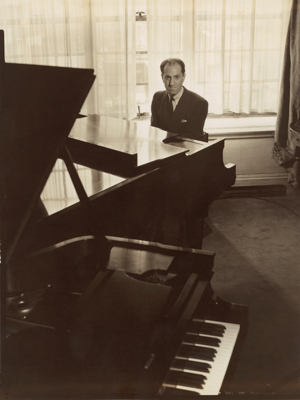By Patrick Monahan, Vanity Fair

George Gershwin in 1935; courtesy of the Conde Nast Archive
In 1976, the 80-year-old Ira Gershwin and his wife, Leonore, invited Michael Feinstein, a 20-year-old singer-pianist, to their house in Beverly Hills and hired him to catalogue their music collection. Feinstein, who grew up in Columbus, Ohio, dreaming of entering that world, leapt at the chance. Ira Gershwin took to the young musician, and they formed a friendship that would bridge almost a century of popular culture. The seven years Feinstein spent with Gershwin (until his death, in 1983) would prove to be the cornerstone of Feinstein's career as a performer, an historian, a nightclub owner, and the preeminent crusader for what is known today as "The American Songbook."
Vanity Fair talked to Michael Feinstein about his new book, The Gershwins and Me, the imminent closure of his eponymous nightclub at the Regency Hotel in Manhattan, and his penchant for reviving times--and songs--gone by.
VF Daily: What was it like to step into the world of the Gershwins?
Michael Feinstein: It was sensory overload from the minute I walked into the Gershwin home . . . The door opens and there is what I later discovered was a self-portrait of Zero Mostel . . . You walk into the living room and, even though I didn't know the artists, there was a Modigliani, which I recognized as being something great, and there was a Picasso. Then there were paintings by George Gershwin, and a grand piano with some music on it . . .
In the book, you describe Leonore Gershwin opening a hidden door and revealing a closet of Gershwin recordings. Did you realize what you were being shown?
I was a record collector and I understood what it meant. Someone else might open the cabinet and say, "Oh, isn't that nice," but I understood it was an oral history of Ira and George's career. It was phonograph records, but it was 78s, and it was test pressings of things that hadn't been released, and then 16-inch discs of radio broadcasts and then reel-to-reel tapes, so it was every technology. I knew that there would be things in there that very few people had ever heard, that I was suddenly privy to something that was unique.
You write that Ira Gershwin told you, "I've only lived my life. You've thoroughly researched it." How did you feel about being in that position?
It was exciting and heady and wonderful because Ira was the source and I could ask him anything. And there are still things that I regret that I hadn't asked him . . . I wish that I had pushed him more about his relationship with George, in that he would only say certain things. If you spoke too much about it, it would put him in a depression because it would bring back George's death. There were certain limitations as to where he would go emotionally, because he was a very private man.
Did Ira Gershwin ever disappoint you?
I think the only disappointing thing is that he couldn't overcome some of his own demons . . . He was so attached to his infirmities . . . In a way that was sad because he could have been healthier, but he only saw it a certain way. He had a quack doctor who didn't help him . . . that was sad because at certain times I would encourage him to work again. He had these unpublished songs; he could have worked on the lyrics again and tweaked them and changed them, and he would start and then he just couldn't do it because he couldn't think clearly.
Do you think knowing Ira Gershwin affects the way you perform his music?
I understand how Ira wants the lyrics sung . . . I would discuss the songs with him or he would talk about the songs. I know to a large extent, as well as anybody, how he wanted certain things conveyed . . . listening to all the different recordings with him and hearing the first recording of "They Can't Take That Away from Me" and then hearing a recording made in 1942 and 1946 and 1950 and 1957 and 1965. I hear the progression, so I understand the different ways in which the songs can be sung . . . The way people want to hear these songs is evolving. One reason I think I still have a career is that I am aware of the shift in musical tides.
Your nightclub, Feinstein's at Loews Regency, is closing at the end of the month. What happens next?
We are finding out if we can make a deal with this one location that I think is the right spot. And for me the right spot is a place that does have a piano bar, that has a larger room that will have dancing, that will have a band, that will have all those things that I've always wanted to have that wasn't possible here at Feinstein's at the Regency . . . that becomes a destination.
The Gershwins and Me is published by Simon & Schuster. Michael Feinstein performs at Feinstein's at Loews Regency through December 31
More from Vanity Fair:
25 Years in the Life of Model Kate Moss
Lady Gaga, Angelina Jolie and Jennifer Aniston: Vanity Fair's Classic Nude Portraits
Royal Babies Photo Scrapbook
Vanity Fair's Exclusive Freaks and Geeks Reunion Photos
